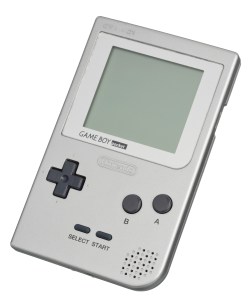 After bringing color to the world of Game Boy in a largely unexpected way at the time, Nintendo would eventually set their sights on another issue with the original hardware: The matter of portability.
After bringing color to the world of Game Boy in a largely unexpected way at the time, Nintendo would eventually set their sights on another issue with the original hardware: The matter of portability.
You see, for all intents and purposes, the Game Boy was a portable piece of gaming hardware, but it was largely only “technically” portable. That is, it did indeed provide a portable experience when compared to the Nintendo Entertainment System (NES) and Super NES, but the practicality of it was limited. While many of us are now used to gaming on devices that easily stow away in our pockets, the Game Boy’s brick-like dimensions meant that more often than not, you were going to need something to carry it in, be it a briefcase, book bag, or one of a variety of specially-designed bags made by Nintendo and third-parties, licensed and unlicensed.
Sure, it was still a portable experience, but unless you had access to that bag at all times or were simply carrying it in your hand wherever you went? Well, that’s time not spent playing, by gum!
The solution? Make it smaller.
In 1996, on July 21st in Japan and September 3rd in North America, Nintendo introduced the Game Boy Pocket. Measuring at 76mm wide, 124mm tall, and 23mm thick to the original Game Boy’s 89 x 148 x 32, the Game Boy Pocket was an altogether sleeker device which better lived up to its name and the promise of gaming on the go than its progenitor.
What’s more, there were other improvements in store. The screen, now actually slightly larger at 4.8 x 4.4cm to the original’s 4.7 x 4.3cm, would not only forego the “creamed spinach color” that previous iterations were known for in favor of a monochromatic black-and-white screen, but feature less blurring as well. The power consumption was improved somewhat as well; while a full loadout of batteries would only get you 10 hours of play time to the original’s 15, you only needed two AAA batteries instead of two AA.
Interestingly, Nintendo’s next iteration of their hit handheld certainly owes something to the idea of history repeating itself.





You must be logged in to post a comment.